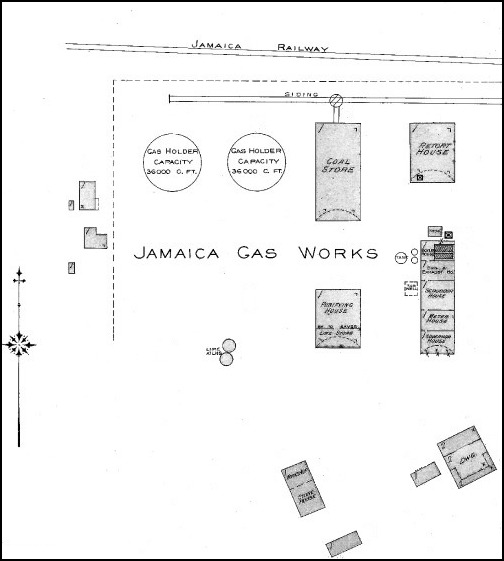gas works
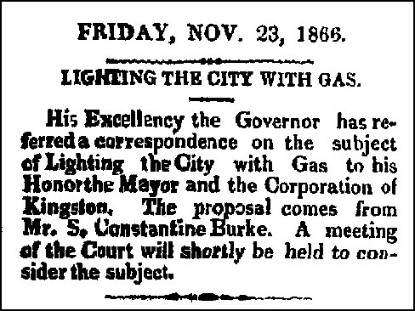
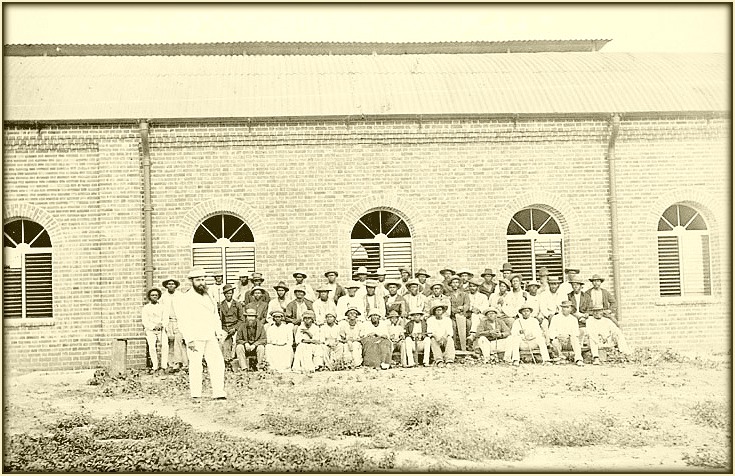
at the Gas Works in 1885
from a map of Kingston in the 1890s
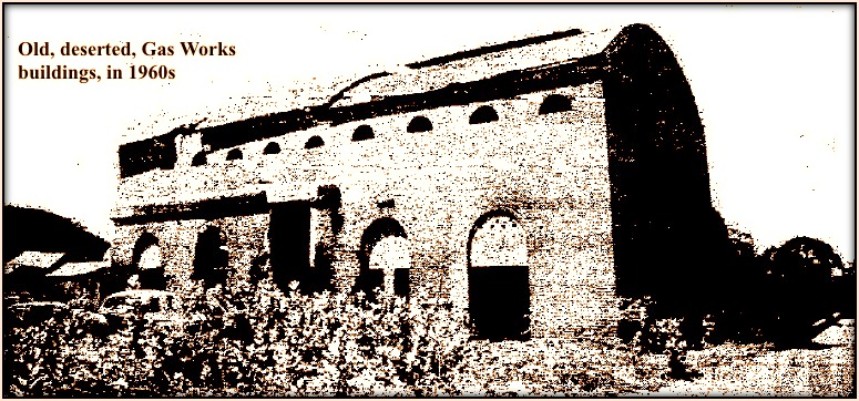
Establishing the Kingston Gas Works
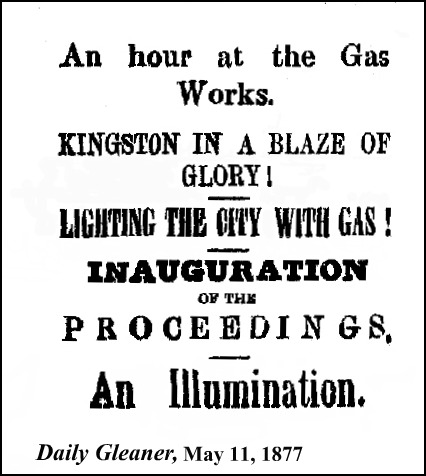
Kingston was in a blaze of glory last night. For the first time in the city's history the streets were lighted up [with coal?] gas - that marvellous illumination agency that it was left for modern science to discover and utilize. It was made a gala night of, a regular out door promenade. The streets were traversed by thousands of well-dressed person[s] of both sexes, to the great majority of whom the scene was as unique as it was novel and brilliant. Groups of persons might have been discerned at various points admiring the unfamiliar spectacle and passing their opinions on it, some of which were as quaint as the sight was splendid and singular, at least to them.
With the view of obtaining some information in respect to the buildings and other constructions constituting the Gas Works, one of our assistants was despatched to the centre of operations yesterday; but, unfortunately, Mr. Stevens, who is at the head of the concern, was absent, and there was no one to shew him round the works. What our assistant saw, however, represented a small village, consisting of a number of buildings
constructed of brick, in a style of really handsome simplicity. Our attaché has had some previous experience in new gas works, having fully described in a leading New York paper all the buildings, appliances and apparatus of the then new Brooklyn Gas Works. But, then he had the advantage of receiving information from an expert - the gentleman who heldthe position corresponding to that of Mr. Stevens. He must, therefore, draw on his recollections of a previous experience, in order to enable him to describe, measurably, what he saw at the Kingston Gas Works, yesterday.
The works, in reality, constitute what may be termed a small village, situated to the Westward of the Railway Station, at or about that well-known spot, near the sea beach, known as Hunt's Bay. They consist of a congeries of brick buildings, covered over with galvanized and corrugated sheet iron, painted in the usual red colour. In a convenient position is the "tank," a large circular structure of thick sheet iron, rising to a considerably height. In some of the buildings the gas is purified by, we suppose as in other parts of the world, passing through lime water - for, as we have before observed, there was no person on the premises qualified to give us definite information. In one of the buildings is situated the metre, with a dial and index, indicating the quantity of gas consumed in a
given time, and it is presumed similar metres, on a smaller scale, will be furnished to each house and public building that may hereafter take the gas. At present the illumination is necessarily confined to the streets and lanes of the city; though our informant at the Works told us that already have quite a number of applications been made for gas in private houses.
A word more about the location of the works may not be superfluous. You pass by the Railway Station, giving it the go-bye, and immediately you are out of town, but only to enter on the pleasant new village already noticed. Passing over a wooden bridge that spans a small creek or brook, you have the Gas Works before you, as already described. From there the main pipes are taken through the principal th[or]oughfares where they ramify through every lane and alley in the city. Thus much for our introductory remarks. May the Gas Works long flourish, and though it may be said, in reference to our city, that "the light of other days is faded, and all the glories gone," we yet hope that this nocturnal illumination may prove emblematical of that better light of coming years which must eventually dawn on our island, if the people of Jamaica but prove true to themselves, as we have no right to anticipate that they will not.
We had almost forgot to say, till this train of thought brought it to our recollection that a gas jet was lit up in our presence, and, as far as we can judge from previous experience, and,
taking into account that the flame was exposed to broad daylight, we have no hesitation in saying that taken in connexion with the experience of last night, the Kingston Gas Works will afford as brilliant a light as any similar institution in the world - Fiat Lux.
Edward Everard Rushworth, the Lieut-
Governor who launched the gas lighting,
died of yellow fever at Shortwood later in
the same year, 1877, on August 10th; he
was buried in the churchyard of the St
Andrew Parish Church, at Half-Way-Tree.
Pursuant to announcement in the "Gleaner," His Honor the Custos, the members of the Municipal Board, and several Magistrates assembled in front of Metcalfe's statue, at eight o'clock, last night, to receive His Excellency, the Lieut,-Governor, for the purpose of inaugurating the proceedings of lighting up the city with gas, for the first time in the history of this country. There was present a guard of honor, consisting of a full company, rank and file of the 2nd West India Regiment, under the command of an officer, and drawn up in front of the Statue. Among the gentlemen present we noticed the honourable J, B. McGlashan, Acting Colonial Secretary; H. J. Bicknell, Esq., Police Magistrate; the honourable D. Power Trench, Collector General; S. Constantine Burke, Esq., Assistant Attorney General Eastern Circuit; S. D. Lindo, Esq., Assistant Attorney General Western Circuit; A. Malabre Esq., J. P.; C. Robinson Esq., J, P.; P. Stern, Esq. Barrister at Law; H. F. Colthirst, Esq., J. P.; the honourable Major General Mann, Director of Roads; William Morrison, Esq., M.A.; J. E, Muir Esq., Clerk to the Municipal Board, and - Stevens, Esq., Engineer to the Gas Works Commissioners. During the day the indefatigable engineer had been engaged in putting up several devices about the town to be lit for the occasion; and it became generally known that there was to be an illumination. Consequently, at 6 o'clock in the afternoon, the inhabitants of the city and its suburbs began to congregate in the vicinity of the Parade, every one eager to get as near as possible to the spot where his Excellency the Governor was to stand, so that by 8 o'clock, when the Magistrates and members of the Municipal Board arrived, there was scarcely standing room between the Parade Gardens and the Parish Church. In this space there were nearly five thousand persons, who, to their credit, be it said, behaved remarkably well, rendering the squad of constables under Inspector Lamb and Crosby and Bravo almost useless. The device in front of the Metcalfe Statue was a large crown, with the words "God Save the Queen,'' forming a semi-circle immediately under it, below which was a wreath of the same shape. At the other end of the street, where Rodney's statue stands the device was " V R," surmounted with a star; at East Queen Street in front of the Jordon Statue, there were the words "Ich Dien," surmounted with a coronet; at the north east corner of the parade there was the letter " V" in the centre of a star; on the right of the Theatre Royal steps, a cross within a star; on the left "V" within a star; at the northern entrance of the parade, "V R" in large letters; at the corner of Orange Street and East-Queen street, a similar design; at the South-West corner of the Parade, "V" within a star; and on the Southern boundary of the Parade, right opposite Peter's Lane, the initial letters of Victoria Regina. Under each of these devices there was a crowd of well dressed persons, anxiously waiting for the hour appointed to light up. At 20 minutes after eight o'clock, the band attached to the guard of honor announced his Excellency the Governor's arrival. His Excellency's carriage contained himself, his lady, Miss Rushworth and Miss Brighton. His Honor the Custos and the magistracy having received the Governor, his Excellency, and the ladies who accompanied him were escorted to positions near the pedestal on which the statue stands, the band playing a lively air during the time. This ceremony over, Mr. Stevens lit a torch and presented it to His Excellency, who applied it to the Crown in the device. Of course the Crown was instantly illuminated, and the people cheered most lustily from one end to another. Mr. Stevens completed the lighting of that design, and lamp lighters proceeded at once to illuminate the others, and to light the lamps, completing the lighting of the three hundred that have been erected within a very short space of time. As soon as Mr. Stevens had finished the work begun by the Governor, His Honor the Custos delivered, in a clear and distinct tone, tho following address: -
May it please your Excellency
We, the Custos,, members of the Municipal Board, and Magistrates of this parish, thank your Excellency for your kind attendance here this evening, to inaugurate the interesting
proceedings of lighting, for the first time, the city of Kingston with gas. In the short period your Excellency is likely to hold the reins of government, time will hardly permit the execution of new works of any magnitude; but the place you will occupy about the person of our expected Governor will afford the opportunity of making known to him the yet unsatisfied wants of Kingston; and we cherish the hope that the weight of your official influence, will be thrown in the scale of further progress, until this city will become, as it should be, the first city in the British West Indies."
To which his Excellency replied somewhat after the following manner: - [It may be mentioned here that our Reporter wrote with great disadvantage, being in a crowd, with persons moving near to his elbow, and having his hat for a writing desk].
Mr. Custos, Members of tho Municipal Board and Magistrates of the City of Kingston, I have very much pleasure in attending here this evening to inaugurate the interesting
proceeding of lighting the city with gas. It is my duty and my greatest pleasure, at this moment, to bear testimony to the very able services which General Mann has rendered in directing this very valuable undertaking. I have also great pleasure in congratulating Mr. Stevens on the successful termination of the work; and I am sure all the inhabitants of Kingston will join me in this; for, it is to the skill of Mr. Stevens. that the success which we now witness is due, • • • I can assure you, it will afford me much pleasure to further all such works as will adorn the city and render it interesting to all strangers who may visit it. (Loud cheers.)
Mr. Stevens having made a short and suitable reply, three cheers were given, for the Queen, the Lieut. Governor, General Mann and Mr. Stevens, respectively, and the proceedings terminated. His Excellency, before he returned home, drove round to the devices and inspected them. The streets remained thronged with well-behaved foot passengers and others until past midnight.


